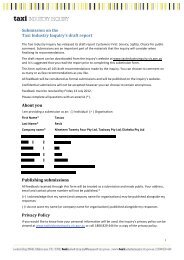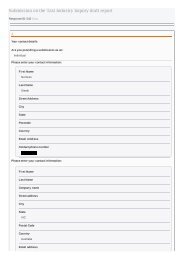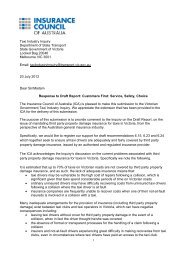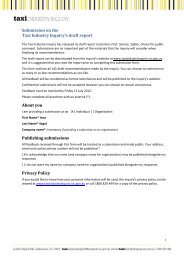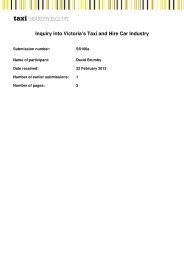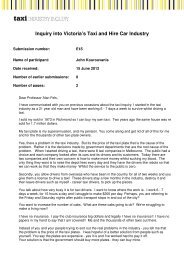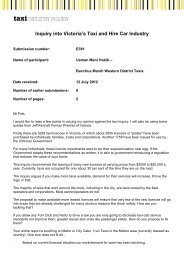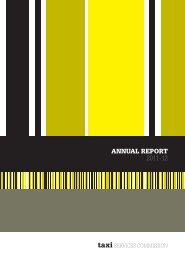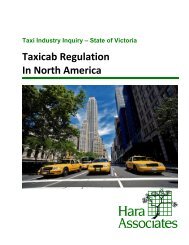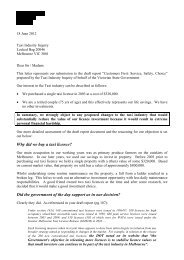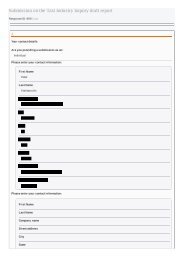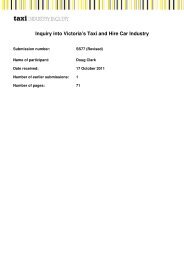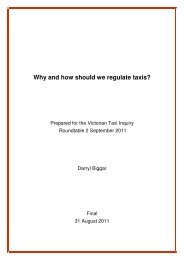Part D â Understanding and improving industry performance (PDF ...
Part D â Understanding and improving industry performance (PDF ...
Part D â Understanding and improving industry performance (PDF ...
You also want an ePaper? Increase the reach of your titles
YUMPU automatically turns print PDFs into web optimized ePapers that Google loves.
12.5.1. Removing regulatory barriers<br />
As a starting point, there are obvious measures that can<br />
be taken to reverse the effects of current regulations<br />
relating to MPTP processing <strong>and</strong> EFTPOS approvals<br />
that have created barriers to competition in the payment<br />
systems market.<br />
In considering alternatives to the exclusive MPTP<br />
arrangement enjoyed by Cabcharge, the inquiry has<br />
identified the features needed to support the MPTP <strong>and</strong><br />
how these features can be supported through outcomesbased<br />
regulation, in conjunction with the collection of incab<br />
data. The inquiry has found that a specific MPTP data<br />
collection provider is not necessary for the processing of<br />
MPTP payments or for the provision of additional services<br />
required by the program (such as driver identification <strong>and</strong><br />
trip data). Implementation of the inquiry’s recommendation<br />
to m<strong>and</strong>ate the installation of meters in taxis that can<br />
transmit all trip data direct from the vehicle to the Taxi<br />
Services Commission will mean that any type of EFTPOS<br />
provider can process MPTP member rebates.<br />
Inquiry finding<br />
è The current arrangements relating to MPTP<br />
data collection <strong>and</strong> the approvals process for<br />
EFTPOS terminals in taxis act as barriers to<br />
entering the payment processing market <strong>and</strong><br />
should be changed.<br />
12.5.2. National regulation<br />
The lack of access to Cabcharge br<strong>and</strong>ed cards has<br />
also reduced competition nationwide in markets for<br />
taxi payments processing. However, the Victorian<br />
Government has little power to effect change in this<br />
area. Competition law rests in the federal domain, with<br />
the ACCC being responsible for ensuring that payments<br />
system arrangements comply with the competition <strong>and</strong><br />
access provisions of the Commonwealth Competition<br />
<strong>and</strong> Consumer Act 2010. As discussed above, the ACCC<br />
has endeavoured to address the commercial barriers to<br />
entry in the past <strong>and</strong> continues to monitor Cabcharge’s<br />
behaviour. The inquiry supports the ACCC’s continued<br />
scrutiny of this issue.<br />
The Reserve Bank of Australia (RBA) also has a key role<br />
in the operation of the payments systems in Australia <strong>and</strong><br />
the inquiry has followed with interest the bank’s recent<br />
review of card surcharging (see case study). The inquiry<br />
wrote to the review to request that it consider any <strong>and</strong> all<br />
measures that will help to ensure that fees charged for<br />
electronic payments for taxi services are consistent with<br />
those that would be charged in a competitive market. 27<br />
27 This submission is available on the inquiry’s website.<br />
The Australian Taxi Drivers Association also brought<br />
practices in the taxi <strong>industry</strong> to the attention of the review:<br />
For thirty years the Australian taxi <strong>industry</strong> has<br />
been at the forefront of unreasonable credit card<br />
surcharge practices, <strong>and</strong> consumers of taxi<br />
passenger credit services have suffered the impost<br />
of excess charges by the dominant monopolistic<br />
supplier of those services. 28<br />
The RBA’s decision to vary the No-Surcharge St<strong>and</strong>ards<br />
to allow payment schemes to limit surcharges may<br />
have significant consequences for taxi passengers<br />
if Visa <strong>and</strong> Mastercard decide to act. These credit<br />
card providers will be able to restrict the amount<br />
businesses charge customers for transactions on<br />
their cards <strong>and</strong> take action against businesses that<br />
impose excessive surcharges on customers. 29<br />
The RBA could also effect change by using its powers<br />
to designate Cabcharge as a payment system. The<br />
Payment Systems Regulation Act 1998 provides the<br />
Board with statutory powers to designate payment<br />
systems. This would enable the Board to impose an<br />
access regime, make st<strong>and</strong>ards, arbitrate disputes <strong>and</strong><br />
give directions to participants in the system.<br />
In 2001, the RBA designated the Bankcard, MasterCard<br />
<strong>and</strong> Visa credit card systems as payment systems under<br />
the Act. In 2003, the RBA determined st<strong>and</strong>ards for the<br />
designated schemes that lowered interchange fees,<br />
removed restrictions on merchants charging customers<br />
for the use of a credit card <strong>and</strong> imposed an access<br />
regime to facilitate entry by new players.<br />
Taxi-specific payment instruments, such as those of<br />
Cabcharge, are not currently designated payment<br />
systems under the Act <strong>and</strong> are not required to comply<br />
with any surcharging st<strong>and</strong>ards or access regimes set by<br />
the RBA. The inquiry would support the designation of<br />
Cabcharge instruments as payment systems in order to<br />
impose regulations that will facilitate greater competition<br />
<strong>and</strong> potentially reduce services fee to a reasonable level.<br />
Inquiry finding<br />
è The ACCC <strong>and</strong> the RBA are well placed<br />
to oversee <strong>and</strong> enforce regulation of anticompetitive<br />
behaviour in the payments<br />
systems market. Ideally, regulation should be<br />
consistent between states to reduce costs for<br />
service providers.<br />
28 ATDA (June 2011), Submission to the RBA into the Review of Card<br />
Surcharging, p.2<br />
29 Malcolm Edey (2012), ‘Current Agenda in Retail Payments Regulation”<br />
Speech to Cards <strong>and</strong> Payments Australasia seminar, Sydney, 20 March<br />
<strong>Underst<strong>and</strong>ing</strong> <strong>industry</strong> <strong>performance</strong> CUSTOMERS FIRST 261



